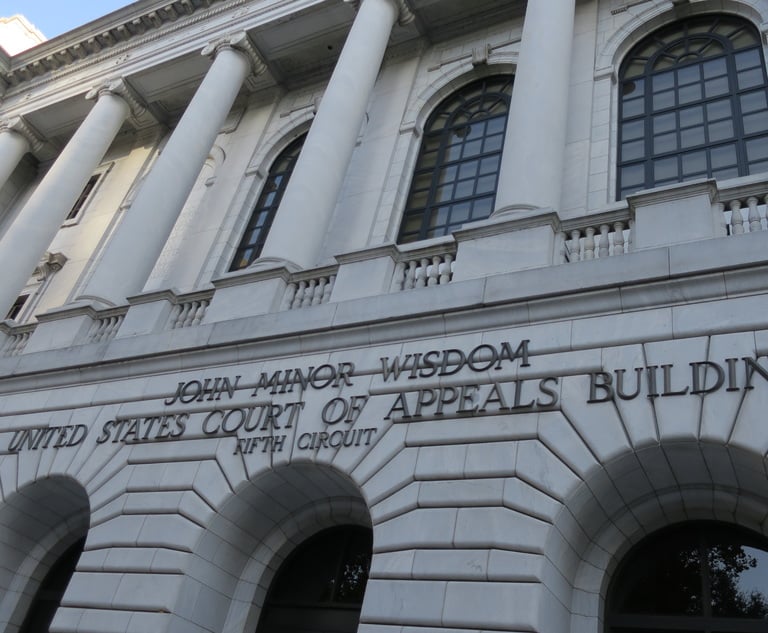Court Rules Oil and Gas Leases Valid During 'Shut-In' Periods
The Pennsylvania Superior Court has ruled that an oil and gas lease between property owners and resource drilling companies was still in effect despite so-called "shut ins"—periods of inactivity in which the lessee still pays the property owner.
January 09, 2020 at 02:23 PM
3 minute read
 Photo: junrong / Shutterstock.com
Photo: junrong / Shutterstock.com
The Pennsylvania Superior Court has ruled that an oil and gas lease between property owners and resource drilling companies was still in effect despite so-called "shut-ins"—periods of inactivity in which the lessee still pays the property owner.
A three-judge panel consisting of Judges John Bender and Deborah Kunselman and Senior Judge Dan Pellegrini affirmed an Armstrong County judge's sustaining of preliminary objections made by defendants Snyder Brothers, PennEnergy Resources and Winfield Resources in the lawsuit filed by plaintiffs Donald Wilson, Shirley Wilson, James Wilson, Marie Wilson and Lara S. Wilson Shields.
According to Pellegrini's Jan. 3 opinion, the Wilsons entered into several lease agreements with the defendants concerning their properties in Armstrong County in 2003. The agreements said that Snyder would have the right to drill within 180 days from the date the lease started and also to extend the lease period by making annual delay rental payments if drilling did not begin during the allotted time. Snyder later assigned some of its drilling rights to PennEnergy and Winfield.
Snyder began drilling on the Wilsons' property in 2010 as well as the surrounding area, during which the Wilsons were paid royalties. In 2017, the Wilsons demanded that drilling stop, alleging that the lease was void because drilling did not begin until 2010, Pellegrini said.
The family also alleged that from 2011 to the present, their leases terminated due to impermissible "shut-in" periods. They accused the defendants of trespassing for the times they claim the lease was void, and alleged breach of contract.
The defendants argued that the Wilsons were paid during the intervening years; the leases did not go into effect until 2010, and the Wilsons accepted royalty payments after drilling started; and the Wilsons never notified the defendants that they considered the leases to be void or terminated, Pellegrini said.
The trial court found that the Wilsons failed to show that the leases had been terminated.
"The Wilsons ratified their original leases beyond the primary term and did not seek to void their amended leases until years after drilling had already begun," Pellegrini said. "As a purely contractual matter, the Wilsons waived any claim they may have had to dispute the validity of the subject leases based on non-production from 2003 until the 2010 ratification in their amended agreements."
He added that the Wilsons' claims regarding non-continuous gas production lacked specificity.
"Without a more precise description of the alleged shut-ins, Snyder/Winfield and PennEnergy cannot determine whether any potential defenses are applicable, such as the Wilsons' failure to give timely notice of a breach," Pellegrini said. "Thus, the Wilsons' shut-in claims lacked the required specificity, and the trial court did not err in sustaining preliminary objections on that basis. Regardless, the Wilsons accepted royalty payments from 2011 until 2017. Therefore, even if the Wilsons could sufficiently assert a shut-in period during that time, their acceptance of payment and lack of notice of a breach would establish that their leases remained valid during that time frame."
Peckville-based Douglas Clark represents the Wilsons and did not return a call seeking comment.
Snyder Brothers and Winfield's attorney, Nathaniel Parker, declined to comment.
Joshua Snyder of Fox Rothschild, who represents PennEnergy, declined to comment.
This content has been archived. It is available through our partners, LexisNexis® and Bloomberg Law.
To view this content, please continue to their sites.
Not a Lexis Subscriber?
Subscribe Now
Not a Bloomberg Law Subscriber?
Subscribe Now
NOT FOR REPRINT
© 2025 ALM Global, LLC, All Rights Reserved. Request academic re-use from www.copyright.com. All other uses, submit a request to [email protected]. For more information visit Asset & Logo Licensing.
You Might Like
View All
Pa. High Court to Weigh Parent Company's Liability for Dissolved Subsidiary's Conduct
3 minute read
Ropes, Wachtell and Milbank Guide Nippon Steel's $14B Acquisition of US Steel
2 minute read

Natural Gas Exploration Companies Sue Over Unpaid Invoices
Law Firms Mentioned
Trending Stories
- 1New York-Based Skadden Team Joins White & Case Group in Mexico City for Citigroup Demerger
- 2No Two Wildfires Alike: Lawyers Take Different Legal Strategies in California
- 3Poop-Themed Dog Toy OK as Parody, but Still Tarnished Jack Daniel’s Brand, Court Says
- 4Meet the New President of NY's Association of Trial Court Jurists
- 5Lawyers' Phones Are Ringing: What Should Employers Do If ICE Raids Their Business?
Who Got The Work
J. Brugh Lower of Gibbons has entered an appearance for industrial equipment supplier Devco Corporation in a pending trademark infringement lawsuit. The suit, accusing the defendant of selling knock-off Graco products, was filed Dec. 18 in New Jersey District Court by Rivkin Radler on behalf of Graco Inc. and Graco Minnesota. The case, assigned to U.S. District Judge Zahid N. Quraishi, is 3:24-cv-11294, Graco Inc. et al v. Devco Corporation.
Who Got The Work
Rebecca Maller-Stein and Kent A. Yalowitz of Arnold & Porter Kaye Scholer have entered their appearances for Hanaco Venture Capital and its executives, Lior Prosor and David Frankel, in a pending securities lawsuit. The action, filed on Dec. 24 in New York Southern District Court by Zell, Aron & Co. on behalf of Goldeneye Advisors, accuses the defendants of negligently and fraudulently managing the plaintiff's $1 million investment. The case, assigned to U.S. District Judge Vernon S. Broderick, is 1:24-cv-09918, Goldeneye Advisors, LLC v. Hanaco Venture Capital, Ltd. et al.
Who Got The Work
Attorneys from A&O Shearman has stepped in as defense counsel for Toronto-Dominion Bank and other defendants in a pending securities class action. The suit, filed Dec. 11 in New York Southern District Court by Bleichmar Fonti & Auld, accuses the defendants of concealing the bank's 'pervasive' deficiencies in regards to its compliance with the Bank Secrecy Act and the quality of its anti-money laundering controls. The case, assigned to U.S. District Judge Arun Subramanian, is 1:24-cv-09445, Gonzalez v. The Toronto-Dominion Bank et al.
Who Got The Work
Crown Castle International, a Pennsylvania company providing shared communications infrastructure, has turned to Luke D. Wolf of Gordon Rees Scully Mansukhani to fend off a pending breach-of-contract lawsuit. The court action, filed Nov. 25 in Michigan Eastern District Court by Hooper Hathaway PC on behalf of The Town Residences LLC, accuses Crown Castle of failing to transfer approximately $30,000 in utility payments from T-Mobile in breach of a roof-top lease and assignment agreement. The case, assigned to U.S. District Judge Susan K. Declercq, is 2:24-cv-13131, The Town Residences LLC v. T-Mobile US, Inc. et al.
Who Got The Work
Wilfred P. Coronato and Daniel M. Schwartz of McCarter & English have stepped in as defense counsel to Electrolux Home Products Inc. in a pending product liability lawsuit. The court action, filed Nov. 26 in New York Eastern District Court by Poulos Lopiccolo PC and Nagel Rice LLP on behalf of David Stern, alleges that the defendant's refrigerators’ drawers and shelving repeatedly break and fall apart within months after purchase. The case, assigned to U.S. District Judge Joan M. Azrack, is 2:24-cv-08204, Stern v. Electrolux Home Products, Inc.
Featured Firms
Law Offices of Gary Martin Hays & Associates, P.C.
(470) 294-1674
Law Offices of Mark E. Salomone
(857) 444-6468
Smith & Hassler
(713) 739-1250





